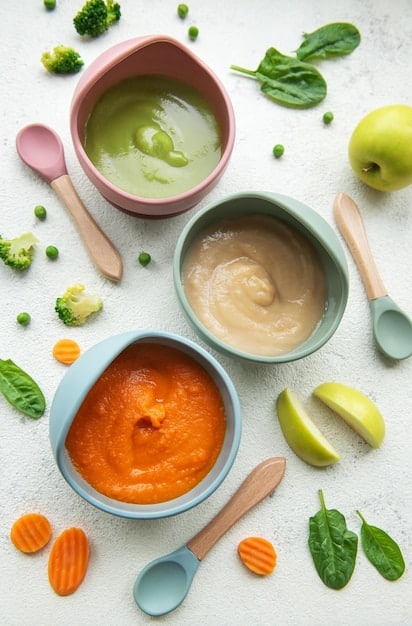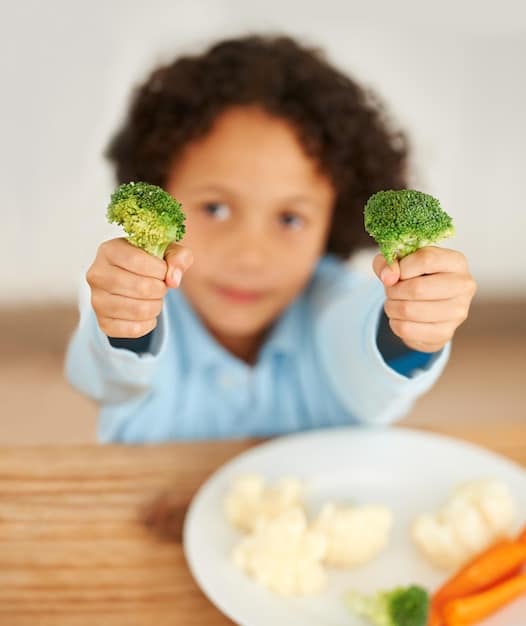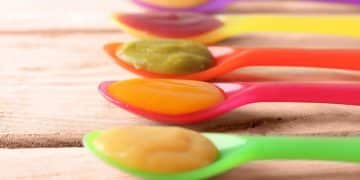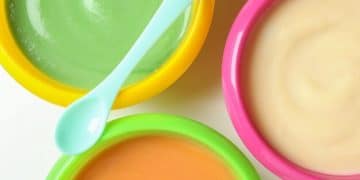Iron-Rich Foods for Babies: Top 5 Choices to Prevent Deficiency

Iron-rich foods are essential for babies to prevent iron deficiency, supporting healthy growth and development, particularly during the first year of life when their iron needs are high.
Introducing solid foods to your baby is an exciting milestone, and ensuring they get enough iron is crucial for their healthy development. Discover the iron-rich foods for babies: preventing deficiency with these top 5 choices, helping you navigate this important stage with confidence.
Why Iron is Essential for Babies
Iron plays a vital role in your baby’s growth and development. It’s a key component of hemoglobin, a protein in red blood cells that carries oxygen from the lungs to the rest of the body. Without enough iron, babies can develop iron deficiency anemia, which can lead to delayed cognitive and motor development.
The Importance of Iron in Early Development
Iron is crucial for brain development, immune function, and energy production. Infants are born with iron stores that gradually deplete, making it essential to introduce iron-rich foods around six months of age, when complementary feeding begins.
Potential Consequences of Iron Deficiency
Iron deficiency can have lasting effects on a baby’s cognitive and motor skills. It can also weaken their immune system, making them more susceptible to infections. Recognizing the signs of iron deficiency and addressing it promptly is essential for ensuring your baby’s optimal health.
- Delayed cognitive development
- Weakened immune system
- Increased risk of infections
- Fatigue and irritability
Ensuring your baby gets enough iron is a proactive step towards supporting their overall well-being. By incorporating iron-rich foods into their diet, you’re helping them build a strong foundation for a healthy future.
Top 5 Iron-Rich Foods for Babies
Introducing the right foods at the right time can make all the difference in preventing iron deficiency. Here are five excellent sources of iron that are easy to incorporate into your baby’s diet.

1. Meat and Poultry
Meat, especially red meat, is one of the best sources of heme iron, which is easily absorbed by the body. Poultry, like chicken and turkey, is also a good source.
Why Meat is an Excellent Source
Meat not only provides iron but also essential amino acids and other nutrients crucial for growth. Opt for lean meats to minimize fat content.
- Beef: Rich in heme iron and easily digestible.
- Chicken: A versatile option that can be pureed or shredded.
- Turkey: Another lean meat option packed with iron.
Pureeing meat or finely chopping it into small, manageable pieces ensures that your baby can safely swallow and digest it.
2. Iron-Fortified Cereals
Iron-fortified cereals are a convenient and reliable source of iron. They are specifically designed for infants and are easily digestible.
These cereals are fortified to meet the iron needs of babies, making them a practical choice for daily feeding.
- Easy to prepare and mix with breast milk or formula.
- Available in different flavors to suit your baby’s palate.
- Provides a consistent source of iron in every serving.
Look for cereals that are low in sugar and additives to ensure you’re giving your baby the healthiest option.
3. Legumes
Legumes like lentils, beans, and chickpeas are excellent plant-based sources of iron. They also offer fiber and protein, making them a nutritious addition to your baby’s diet.
Legumes are a vegetarian-friendly option that can be easily pureed or mashed for babies.
Benefits of Including Legumes
- Lentils: Cooked and pureed, they offer a smooth texture and mild flavor.
- Black Beans: A good source of iron and fiber.
- Chickpeas: Can be made into hummus for older babies who can handle the texture.
To make legumes easier to digest, soak them overnight and cook them thoroughly until they are soft.
4. Leafy Green Vegetables
Spinach, kale, and other leafy green vegetables are packed with iron, vitamins, and minerals. While they contain non-heme iron (which is less easily absorbed than heme iron), pairing them with vitamin C-rich foods can enhance absorption.
Leafy greens are a powerhouse of nutrients that support your baby’s overall health.
- Spinach: Can be steamed and pureed for easy consumption.
- Kale: Ensure it’s finely chopped or pureed to avoid choking hazards.
- Broccoli: Another nutrient-rich option that can be steamed until soft.
Combine leafy greens with foods like tomatoes or citrus fruits to boost iron absorption.
5. Tofu
Tofu is a versatile and iron-rich food made from soybeans. It has a mild flavor that easily absorbs other flavors, making it a great addition to various baby food recipes.
Tofu is a plant-based protein source that is gentle on your baby’s digestive system.
- Provides a good amount of non-heme iron.
- Can be blended into purees or cut into small cubes for older babies.
- Absorbs flavors well, making it easy to incorporate into different dishes.
Choose firm or silken tofu, depending on the texture you prefer for your baby’s meals.
Tips for Enhancing Iron Absorption
Maximizing iron absorption is just as important as choosing the right foods. Here are some strategies to help your baby get the most out of their iron-rich meals.

Pair Iron-Rich Foods with Vitamin C
Vitamin C significantly enhances the absorption of non-heme iron. Combine iron-rich foods with sources of vitamin C, such as:
- Tomatoes
- Citrus Fruits
- Bell Peppers
- Strawberries
Adding a small amount of these fruits or vegetables to your baby’s iron-rich meals can make a big difference.
Avoid Giving Iron with Dairy Products
Calcium in dairy products can inhibit iron absorption. Avoid giving iron-rich foods with milk, yogurt, or cheese.
Try to space out the consumption of dairy and iron-rich foods by at least an hour to maximize iron intake.
Be Mindful of Phytates and Tannins
Phytates (found in grains and legumes) and tannins (found in tea and coffee) can also interfere with iron absorption. It is best to avoid giving tea or coffee to children. To reduce the phytate content in grains and legumes, soak them before cooking.
Preparing grains and legumes properly can help minimize the impact of phytates on iron absorption.
By implementing these strategies, you can help ensure your baby is absorbing as much iron as possible from their diet, supporting their healthy growth and development.
Recognizing and Addressing Iron Deficiency
Knowing the signs of iron deficiency and how to respond is crucial for your baby’s health. Here’s what to look for and when to seek medical advice.
Common Signs of Iron Deficiency in Babies
Early detection can prevent more serious health issues. Watch for the following signs:
- Pale Skin: A noticeable paleness, especially in the face and inner eyelids.
- Fatigue: Unusual tiredness or weakness.
- Irritability: Increased fussiness or irritability.
- Poor Appetite: Lack of interest in eating.
- Slow Growth: Slower than expected growth rate.
If you notice any of these signs, it’s important to consult with your pediatrician.
When to Seek Medical Advice
If you suspect your baby might be iron deficient, consult your pediatrician. They can perform a simple blood test to check your baby’s iron levels.
A blood test is the most accurate way to determine if your baby has an iron deficiency.
Treating Iron Deficiency
If your baby is diagnosed with iron deficiency, your pediatrician may recommend iron supplements. It’s crucial to follow their instructions carefully.
Iron supplements can help replenish iron stores and address the deficiency, but they should only be given under medical supervision.
Incorporating Iron-Rich Foods into Your Baby’s Diet: Meal Ideas
Here are some meal ideas to help you incorporate iron-rich foods into your baby’s diet deliciously and effectively.
Breakfast Ideas
Start your baby’s day with an iron boost.
- Iron-Fortified Cereal with Pureed Berries: Combine iron-fortified cereal with a vitamin C-rich fruit puree.
- Tofu Scramble: Soft tofu, lightly scrambled and served with a side of pureed vegetables.
These options are not only nutritious but also easy for your baby to eat and digest.
Lunch Ideas
Midday meals can be both tasty and packed with iron.
- Lentil Soup: Pureed lentil soup with a mild flavor and creamy texture.
- Chicken and Sweet Potato Puree: A balanced meal with iron and essential vitamins.
These meals ensure your baby gets a good dose of iron along with other essential nutrients.
Dinner Ideas
End the day with a hearty and iron-rich dinner.
- Ground Beef and Spinach Puree: Lean ground beef combined with pureed spinach for an iron-packed meal.
- Broccoli and Tofu Bites: Small, soft bites of steamed broccoli and tofu.
These dinner options are designed to provide a nutritious and filling meal for your baby.
| Key Point | Brief Description |
|---|---|
| 💪 Iron-Rich Foods | Meat, fortified cereals, legumes, leafy greens, and tofu are excellent iron sources. |
| 🍊 Vitamin C Boost | Pair iron-rich foods with vitamin C to enhance iron absorption. |
| 🥛 Avoid with Dairy | Avoid combining iron-rich foods with dairy products to maximize iron uptake. |
| 🚩 Recognize Signs | Watch for paleness, fatigue, and irritability—consult a pediatrician if concerned. |
Frequently Asked Questions
▼
It’s generally recommended to start introducing iron-rich foods around six months of age, when your baby’s iron stores begin to deplete and they are ready for complementary feeding.
▼
Babies between 7-12 months need approximately 11 mg of iron per day. Ensure their diet includes a variety of iron-rich foods to meet this requirement and support their growth.
▼
While iron supplements can be necessary in some cases, it’s generally better to prioritize iron-rich foods. Supplements should only be given under the guidance of a pediatrician.
▼
Excellent vegetarian sources of iron include legumes (like lentils and beans), tofu, and iron-fortified cereals. Pair these with vitamin C-rich foods to enhance iron absorption and ensure proper nutrient intake.
▼
Watch for signs like healthy skin tone, sustained energy levels, and consistent growth. If you’re concerned, consult your pediatrician. They can perform a quick blood test to check your baby’s iron levels.
Conclusion
Ensuring your baby gets enough iron is essential for their growth, development, and overall well-being. By incorporating these iron-rich foods for babies: preventing deficiency with these top 5 choices into their diet and following the tips for enhancing iron absorption, you can help your little one thrive during this crucial stage of life.





